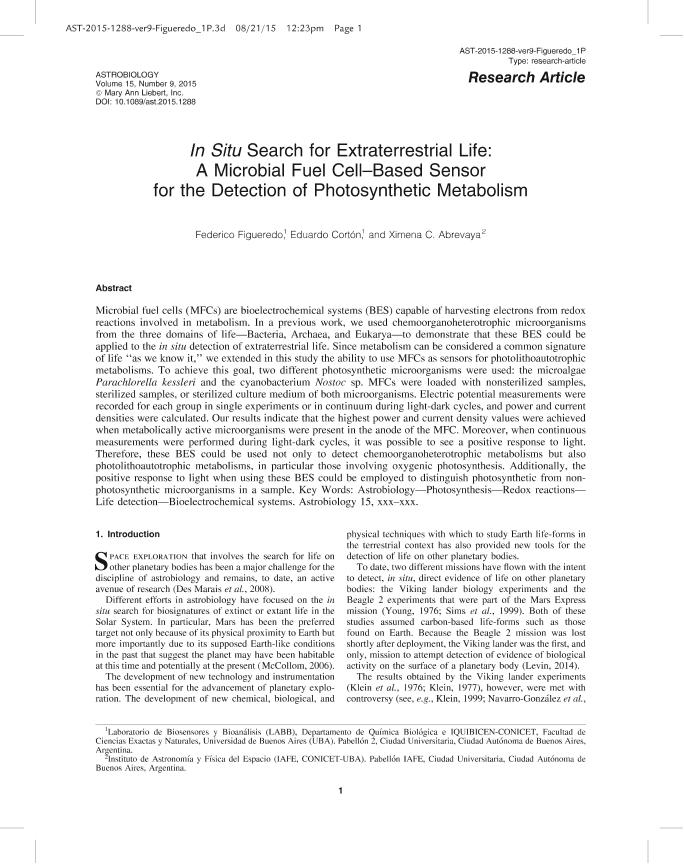Mostrar el registro sencillo del ítem
dc.contributor.author
Figueredo, Federico

dc.contributor.author
Corton, Eduardo

dc.contributor.author
Abrevaya, Ximena Celeste

dc.date.available
2018-06-18T20:07:51Z
dc.date.issued
2015-09
dc.identifier.citation
Figueredo, Federico; Corton, Eduardo; Abrevaya, Ximena Celeste; In situ search for extraterrestrial life: A microbial fuel cell-based sensor for the detection of photosynthetic metabolism; Mary Ann Liebert; Astrobiology; 15; 9; 9-2015; 717-727
dc.identifier.issn
1531-1074
dc.identifier.uri
http://hdl.handle.net/11336/49119
dc.description.abstract
Microbial fuel cells (MFCs) are bioelectrochemical systems (BES) capable of harvesting electrons from redox reactions involved in metabolism. In a previous work, we used chemoorganoheterotrophic microorganisms from the three domains of life - Bacteria, Archaea, and Eukarya - to demonstrate that these BES could be applied to the in situ detection of extraterrestrial life. Since metabolism can be considered a common signature of life "as we know it," we extended in this study the ability to use MFCs as sensors for photolithoautotrophic metabolisms. To achieve this goal, two different photosynthetic microorganisms were used: the microalgae Parachlorella kessleri and the cyanobacterium Nostoc sp. MFCs were loaded with nonsterilized samples, sterilized samples, or sterilized culture medium of both microorganisms. Electric potential measurements were recorded for each group in single experiments or in continuum during light-dark cycles, and power and current densities were calculated. Our results indicate that the highest power and current density values were achieved when metabolically active microorganisms were present in the anode of the MFC. Moreover, when continuous measurements were performed during light-dark cycles, it was possible to see a positive response to light. Therefore, these BES could be used not only to detect chemoorganoheterotrophic metabolisms but also photolithoautotrophic metabolisms, in particular those involving oxygenic photosynthesis. Additionally, the positive response to light when using these BES could be employed to distinguish photosynthetic from nonphotosynthetic microorganisms in a sample.
dc.format
application/pdf
dc.language.iso
eng
dc.publisher
Mary Ann Liebert

dc.rights
info:eu-repo/semantics/openAccess
dc.rights.uri
https://creativecommons.org/licenses/by-nc-sa/2.5/ar/
dc.subject
Astrobiology
dc.subject
Bioelectrochemical Systems
dc.subject
Life Detection
dc.subject
Photosynthesis
dc.subject
Redox Reactions
dc.subject.classification
Otras Ciencias Químicas

dc.subject.classification
Ciencias Químicas

dc.subject.classification
CIENCIAS NATURALES Y EXACTAS

dc.title
In situ search for extraterrestrial life: A microbial fuel cell-based sensor for the detection of photosynthetic metabolism
dc.type
info:eu-repo/semantics/article
dc.type
info:ar-repo/semantics/artículo
dc.type
info:eu-repo/semantics/publishedVersion
dc.date.updated
2018-06-07T20:01:35Z
dc.journal.volume
15
dc.journal.number
9
dc.journal.pagination
717-727
dc.journal.pais
Estados Unidos

dc.journal.ciudad
Nueva York
dc.description.fil
Fil: Figueredo, Federico. Consejo Nacional de Investigaciones Científicas y Técnicas. Oficina de Coordinación Administrativa Ciudad Universitaria. Instituto de Química Biológica de la Facultad de Ciencias Exactas y Naturales. Universidad de Buenos Aires. Facultad de Ciencias Exactas y Naturales. Instituto de Química Biológica de la Facultad de Ciencias Exactas y Naturales; Argentina
dc.description.fil
Fil: Corton, Eduardo. Consejo Nacional de Investigaciones Científicas y Técnicas. Oficina de Coordinación Administrativa Ciudad Universitaria. Instituto de Química Biológica de la Facultad de Ciencias Exactas y Naturales. Universidad de Buenos Aires. Facultad de Ciencias Exactas y Naturales. Instituto de Química Biológica de la Facultad de Ciencias Exactas y Naturales; Argentina
dc.description.fil
Fil: Abrevaya, Ximena Celeste. Consejo Nacional de Investigaciónes Científicas y Técnicas. Oficina de Coordinación Administrativa Ciudad Universitaria. Instituto de Astronomía y Física del Espacio. - Universidad de Buenos Aires. Facultad de Ciencias Exactas y Naturales. Instituto de Astronomía y Física del Espacio; Argentina
dc.journal.title
Astrobiology

dc.relation.alternativeid
info:eu-repo/semantics/altIdentifier/url/https://www.liebertpub.com/doi/10.1089/ast.2015.1288
dc.relation.alternativeid
info:eu-repo/semantics/altIdentifier/doi/http://dx.doi.org/10.1089/ast.2015.1288
Archivos asociados
